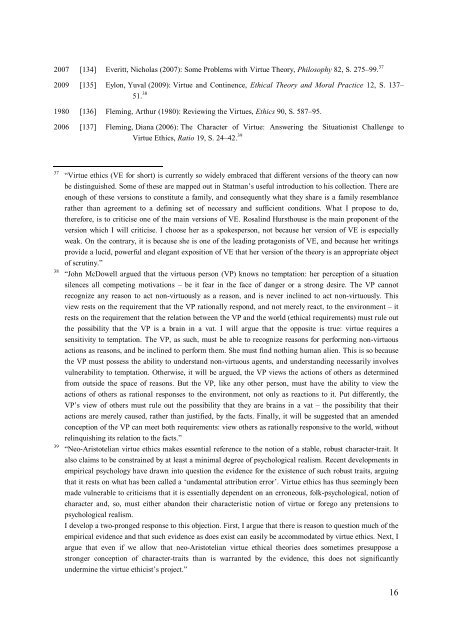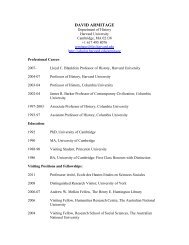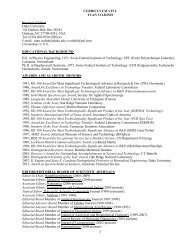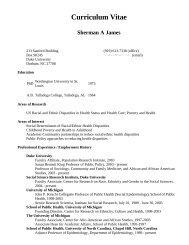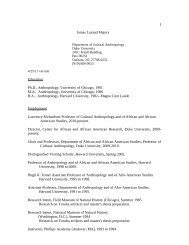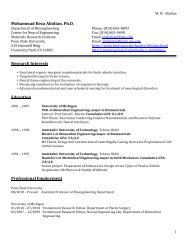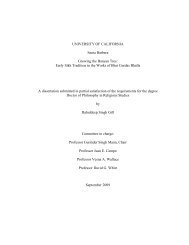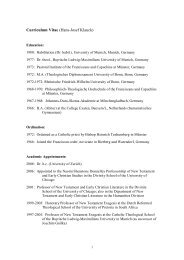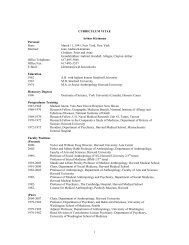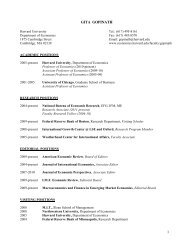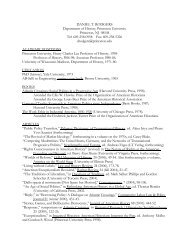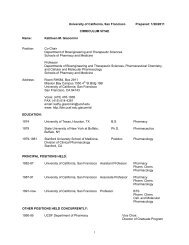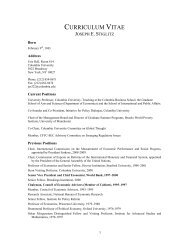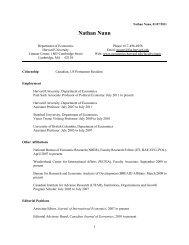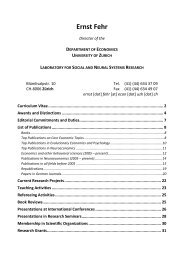Literatur zur Tugendethik Bibliography on Virtue ... - Academic Room
Literatur zur Tugendethik Bibliography on Virtue ... - Academic Room
Literatur zur Tugendethik Bibliography on Virtue ... - Academic Room
- No tags were found...
Create successful ePaper yourself
Turn your PDF publications into a flip-book with our unique Google optimized e-Paper software.
2007 [134] Everitt, Nicholas (2007): Some Problems with <strong>Virtue</strong> Theory, Philosophy 82, S. 275–99. 372009 [135] Eyl<strong>on</strong>, Yuval (2009): <strong>Virtue</strong> and C<strong>on</strong>tinence, Ethical Theory and Moral Practice 12, S. 137–51. 381980 [136] Fleming, Arthur (1980): Reviewing the <strong>Virtue</strong>s, Ethics 90, S. 587–95.2006 [137] Fleming, Diana (2006): The Character of <strong>Virtue</strong>: Answering the Situati<strong>on</strong>ist Challenge to<strong>Virtue</strong> Ethics, Ratio 19, S. 24–42. 39373839“<strong>Virtue</strong> ethics (VE for short) is currently so widely embraced that different versi<strong>on</strong>s of the theory can nowbe distinguished. Some of these are mapped out in Statman’s useful introducti<strong>on</strong> to his collecti<strong>on</strong>. There areenough of these versi<strong>on</strong>s to c<strong>on</strong>stitute a family, and c<strong>on</strong>sequently what they share is a family resemblancerather than agreement to a defining set of necessary and sufficient c<strong>on</strong>diti<strong>on</strong>s. What I propose to do,therefore, is to criticise <strong>on</strong>e of the main versi<strong>on</strong>s of VE. Rosalind Hursthouse is the main prop<strong>on</strong>ent of theversi<strong>on</strong> which I will criticise. I choose her as a spokespers<strong>on</strong>, not because her versi<strong>on</strong> of VE is especiallyweak. On the c<strong>on</strong>trary, it is because she is <strong>on</strong>e of the leading protag<strong>on</strong>ists of VE, and because her writingsprovide a lucid, powerful and elegant expositi<strong>on</strong> of VE that her versi<strong>on</strong> of the theory is an appropriate objectof scrutiny.”“John McDowell argued that the virtuous pers<strong>on</strong> (VP) knows no temptati<strong>on</strong>: her percepti<strong>on</strong> of a situati<strong>on</strong>silences all competing motivati<strong>on</strong>s – be it fear in the face of danger or a str<strong>on</strong>g desire. The VP cannotrecognize any reas<strong>on</strong> to act n<strong>on</strong>-virtuously as a reas<strong>on</strong>, and is never inclined to act n<strong>on</strong>-virtuously. Thisview rests <strong>on</strong> the requirement that the VP rati<strong>on</strong>ally resp<strong>on</strong>d, and not merely react, to the envir<strong>on</strong>ment – itrests <strong>on</strong> the requirement that the relati<strong>on</strong> between the VP and the world (ethical requirements) must rule outthe possibility that the VP is a brain in a vat. I will argue that the opposite is true: virtue requires asensitivity to temptati<strong>on</strong>. The VP, as such, must be able to recognize reas<strong>on</strong>s for performing n<strong>on</strong>-virtuousacti<strong>on</strong>s as reas<strong>on</strong>s, and be inclined to perform them. She must find nothing human alien. This is so becausethe VP must possess the ability to understand n<strong>on</strong>-virtuous agents, and understanding necessarily involvesvulnerability to temptati<strong>on</strong>. Otherwise, it will be argued, the VP views the acti<strong>on</strong>s of others as determinedfrom outside the space of reas<strong>on</strong>s. But the VP, like any other pers<strong>on</strong>, must have the ability to view theacti<strong>on</strong>s of others as rati<strong>on</strong>al resp<strong>on</strong>ses to the envir<strong>on</strong>ment, not <strong>on</strong>ly as reacti<strong>on</strong>s to it. Put differently, theVP’s view of others must rule out the possibility that they are brains in a vat – the possibility that theiracti<strong>on</strong>s are merely caused, rather than justified, by the facts. Finally, it will be suggested that an amendedc<strong>on</strong>cepti<strong>on</strong> of the VP can meet both requirements: view others as rati<strong>on</strong>ally resp<strong>on</strong>sive to the world, withoutrelinquishing its relati<strong>on</strong> to the facts.”“Neo-Aristotelian virtue ethics makes essential reference to the noti<strong>on</strong> of a stable, robust character-trait. Italso claims to be c<strong>on</strong>strained by at least a minimal degree of psychological realism. Recent developments inempirical psychology have drawn into questi<strong>on</strong> the evidence for the existence of such robust traits, arguingthat it rests <strong>on</strong> what has been called a ‘undamental attributi<strong>on</strong> error’. <strong>Virtue</strong> ethics has thus seemingly beenmade vulnerable to criticisms that it is essentially dependent <strong>on</strong> an err<strong>on</strong>eous, folk-psychological, noti<strong>on</strong> ofcharacter and, so, must either aband<strong>on</strong> their characteristic noti<strong>on</strong> of virtue or forego any pretensi<strong>on</strong>s topsychological realism.I develop a two-pr<strong>on</strong>ged resp<strong>on</strong>se to this objecti<strong>on</strong>. First, I argue that there is reas<strong>on</strong> to questi<strong>on</strong> much of theempirical evidence and that such evidence as does exist can easily be accommodated by virtue ethics. Next, Iargue that even if we allow that neo-Aristotelian virtue ethical theories does sometimes presuppose astr<strong>on</strong>ger c<strong>on</strong>cepti<strong>on</strong> of character-traits than is warranted by the evidence, this does not significantlyundermine the virtue ethicist’s project.”16


